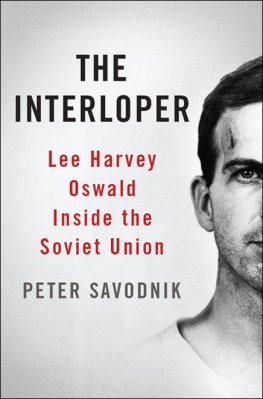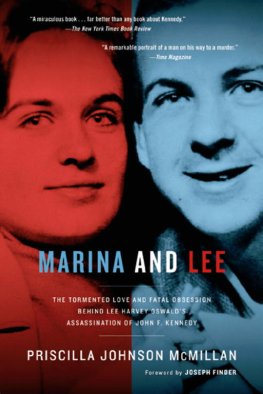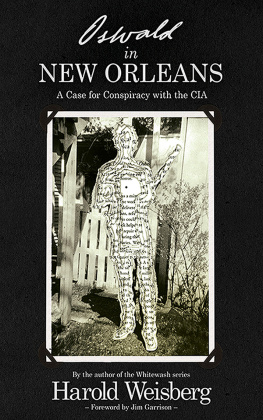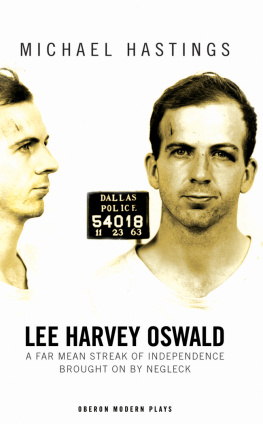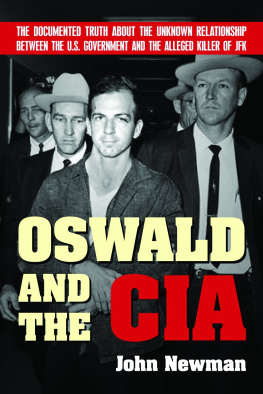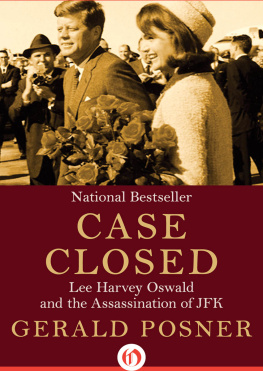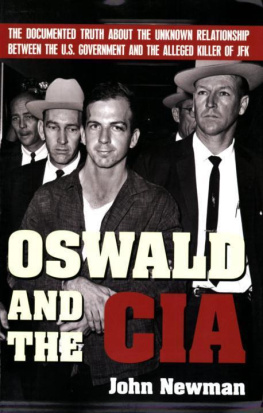THE INTERLOPER
THE
INTERLOPER
Lee Harvey Oswald
Inside the Soviet Union
PETER SAVODNIK
BASIC BOOKS
A MEMBER OF THE PERSEUS BOOKS GROUP
New York
Copyright 2013 by Peter Savodnik
Published by Basic Books,
A Member of the Perseus Books Group
All rights reserved. No part of this book may be reproduced in any manner whatsoever without written permission except in the case of brief quotations embodied in critical articles and reviews. For information, address Basic Books, 250 West 57th Street, New York, NY 10107.
Books published by Basic Books are available at special discounts for bulk purchases in the United States by corporations, institutions, and other organizations. For more information, please contact the Special Markets Department at the Perseus Books Group, 2300 Chestnut Street, Suite 200, Philadelphia, PA 19103, or call (800) 810-4145, ext. 5000, or e-mail .
Designed by Timm Bryson
A CIP catalog record for this book is available from the Library of Congress.
ISBN: 978-0-465-02907-5
10 9 8 7 6 5 4 3 2 1
To my mother and father
CONTENTS
Many people helped bring this book to fruition, and I have, no doubt, forgotten some of them. Those whom I have not forgotten are:
Friends and/or fellow journalists who offered criticism, humor, and generosity: Miriam Elder, Dan Shea and Yulia Golobokova, Stephen Bier-man, Charles Case and Will Mauldin. Thank you also to Andrew Kramer, for raising some thoughtful questions, and Julia Ioffe, for putting me in touch with her lovely grandmother Emma Bruk, who gave me a tour of Botkinskaya Hospital, where she was once a doctor and Lee Harvey Oswald was once a patient.
In Moscow, Sima Horunzhaya and Tatyana Voronina helped unearth former KGB officers and Intourist guides, and Lena Kamenskaya and her husband, Sasha, told me the way things really were in the time of Nikita Khrushchev. In Minsk, I was helped by Olga Nenadovets, Katya Lysenko, Katya Yakukhina, Nikolai Ovsianko, and Tatyana Schastnaya. Eduard Sagindikov, the current resident of Apartment 24, Kommunistichiskaya Ulitsa, put up with innumerable visits and queries.
I am grateful for my editor at Basic Books, Lara Heimert. Roger Labrie also offered excellent editorial comments. My agent, Ted Weinstein, was a tireless advocate.
I am indebted to two of my former editors: Dick Reston, at The Vineyard Gazette, and Wayne Mogielnicki, at The Daily Progress, both of whom stoked my interest in Russia.
I am appreciative of the many engaging and provocative Oswald- and Kennedy-themed conversations I was afforded while teaching a winter term course in 2011 and 2012 at Middlebury College. I owe special thanks to my former teachers Murray Dry, Michael Kraus, and Allison Stanger for offering some of the best and most trenchant criticism I received; Stephen Donadio for his wonderful insights into the mid-twentieth-century American scene; and Tatyana Smorodinskaya and Michael Katz for expanding my knowledge of Russian literature and culture.
My sister and brother-in-law, Sabrina and Adam Schaeffer, offered great support, especially when I was in need of a place to sleep in Washington. So, too, did my in-laws, Dan and Diana Weber, who gave me plenty of encouraging words and somehow never took offense when I excused myself to write. My beautiful wife, Kate, has been at the very center of this endeavor from the start: she walked the streets of Minsk with me, read several drafts of the book, figured out before I did what needed to be rewritten or cut, and suffered through innumerable conversations about Oswald, who has been the third person in this relationship since we met. Her love and devotion make this book as much hers as it is mine.
Finally, I owe my greatest thanks to my mother and father. Their limitless enthusiasm and love and wisdom helped sustain this project through many long nights in the former Soviet Union.
This book makes three arguments: First, that Lee Harvey Oswald acted alone in murdering John F. Kennedy. Second, that the more important question, the question that we should have spent the past half century debating but have not (satisfactorily), is why Oswald felt compelled to kill the president and what this tells us about him, the United States, and the Cold War. Third, that we can learn about why Oswald killed the president by examining the nearly three years he spent in the Soviet Union, from October 1959 to June 1962, during which time he traveled to Moscow, tried to kill himself, moved to the city of Minsk, worked at a radio and television factory, made friends, enjoyed the company of several young women, married, and became a father.
The Interloper is about Oswalds Soviet period: why he ventured to the USSR in the first place, what he did there, whom he met, how he was affected by his time there, and why he left. Most of the information comes from interviews I conducted with people who knew Oswaldcoworkers, friends, relatives of friends, neighbors, and acquaintances, mostly in Minsk but elsewhere as well, including the Marine Corps and Dallas. My research benefited mightily from the US National Archives more than five million pages of letters, testimonies, CIA and FBI reports, maps, photographs, and other documents related to the JFK assassination, and I was helped by several Russians and Belarusians who shared with me photographs, letters, passports, and housing and work papers from the late fifties and early sixties. Most of this later material is newly reported and sheds fresh light on the events leading up to the tragedy in Dallas.
There are three factors that make Oswalds Soviet period so important. He lived in the Soviet Union longer than anywhere else, except for one of his many childhood homes (about which he had little say). The Soviet chapter of his life represented the culmination of Oswalds uneasy development, and his experiences there offer a much more three-dimensional view of the man than those of any of his other addresses. And it is in the Soviet Union that Oswald tried, unsuccessfully, to put an end to a pattern of interloping from one address to another. This was among his most important failures in a life that was a series of failures.
By interloping I am referring to Oswalds repeated attempts to flee from his old life and to insert himself into a new one adorned with new people and a new landscape and a new language or accentwith the hope, however desperate, that this time he might find a permanent home. In each instance he failed, and with each failure his sense of not fitting inhis alienationintensified greatly. Oswalds interloping was foreshadowed by his fragmented and frenetic childhood, but it did not really take shape until his late adolescence. That was when he began to jump, of his own volition, from one new home to the next. First, he enlisted in the Marines; then, he defected to the Soviet Union; then, he returned to the United States; then, he fled to Mexico (with the intention of heading on to Cuba or back to Russia); then, finally, he returned, once again, to the United States. In all of these cases, his jumping, or interloping, was meant to lead to a happy resolution, and in all of them, it did not. What distinguished his Soviet chapter from the others was that it was in the Soviet Union that Oswald came closest to ending this progression of people and places. It was in Moscow, and especially in Minsk, that the whole process of Oswalds nearly constant movement was laid bare and that Oswald, unable to fit in, was confronted with the awful realization that this movement, this hopeless wandering, would never stop. It was there that the desperation and fury coursing through his whole life were most fully and powerfully on display. And it was there that his eventual assassination of the president was most clearly foreshadowed.
Next page

